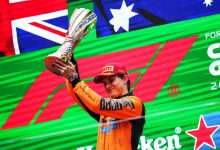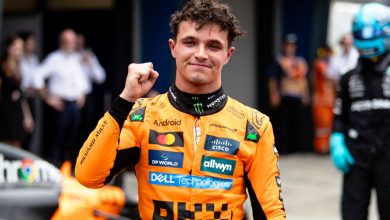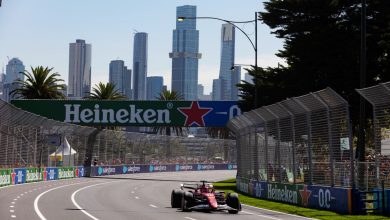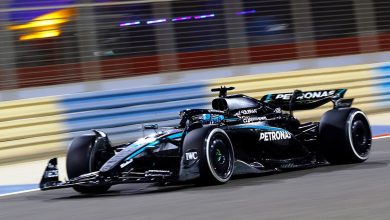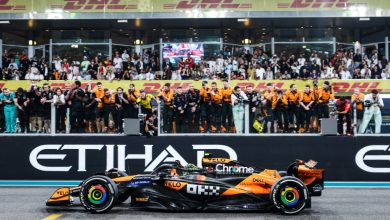Team leaders agree Tribunal process as fair: Friday press meet
TEAM REPRESENTATIVES – Graeme LOWDON (Marussia), Eric BOULLIER (Lotus), Christian HORNER (Red Bull Racing), Ross BRAWN (Mercedes), Martin WHITMARSH (McLaren)
PRESS CONFERENCE
Gentlemen, a general question about the International Tribunal. It’s the first time it’s been used in Formula One. What did you think about it and what about the outcome? First of all, Eric.
Eric BOULLIER: I think the system went quite well I think. All the judges and the way it was working went quite smoothly and as far as I understand the process was fine.
Graham?
Graeme LOWDON: As Eric says, the process itself, it’s the first time we’ve seen it in action and from what we could see it was a pretty fair and transparent process. We were happy to see the outcome in terms of how the Tribunal saw it. I can’t really comment on the penalty that they suggested as I think that is entirely down to the Tribunal but the thing we could probably do with a bit more clarity on, is that the Tribunal referred to the mitigating circumstances in choosing the penalty and we couldn’t really see very many. The mitigating circumstances didn’t look terribly mitigating. Perhaps that’s something that will come over time with the process.
Martin?
Martin WHITMARSH: I haven’t got much to add really. We didn’t take an active role. I know some of my colleagues here were there, they saw it. I think it’s clearly an independent process and that’s a good thing. In regards to this particular case I think others are better equipped to comment on it.
Ross, obviously you were involved – your thoughts?
Ross BRAWN: Very involved yes. I think rightly or wrongly there has been criticism in the past of the process and I think what the FIA has done, particularly with the president of the FIA, is put in place a process which I don’t believe there can be any criticism of it in that respect. It’s an independent tribunal. People may always have their opinions about the opinions of the Tribunal but I think the process itself can’t be criticised. This is the first time we’ve seen it in action and I think we can have confidence in the future that at least it will be independent. My understanding was that the selection of the judges was completely independent, coming from a potential panel of 12, people who obviously have some knowledge of sport, particularly motor sport and they judged the case on the facts and did what they felt was appropriate. We can have opinions about the outcome of the case but I think the process is very encouraging for the future and one that should give teams in Formula One or teams in motor sport confidence.
Christian, your thoughts on the process and the outcome?
Christian HORNER: I think the process was fine. It was the first time it happened. I think that the relevant parties made their case and that the judges did a good in running the Tribunal and had all the facts placed in front of them. The verdict they reached was, I think, the right one. The penalty they applied? I have to be a bit careful because he’s bigger than I am, sitting next to me! Possibly it was a bit soft but, you know, it was a fair process and it was certainly interesting to see how it panned out. I think the biggest thing to come out of it is clarity. We need to know what the rules are – whether you can test a 2011 car for more than a 1000km or whether you can test a 2013 car etc, etc. The big thing for us moving on from the Tribunal is to get absolute clarity for the remainder of this year and moving forward as to what constitutes testing and what does not.
Ross, I’ll give you the chance to come back on that. Christian says it was a bit soft. It was the penalty your QC suggested at the end of the proceedings, so do you see it that way.
RB: No, I’m bound to disagree with Christian.
I’m sure there’ll be more on this later. Returning to Eric then, a new consortium since we were last all together has come in and bought a shareholding in your team, a 35 percent shareholding. Why this moment and why are they the right investor?
EB: Why this moment? I think it’s just because the opportunity came up. As Genii Capital said a long time ago they are picking the right partner to join the team. We were the only team in terms of structuring only one owner. They were thinking for the right partner and once they found it I guessed they signed it and I guess this is the timing.
Obviously with Mark Webber announcing his retirement there’s been a lot of speculation suggesting Kimi Raikkonen your lead driver is a target for Red Bull. He says he’s out of contract at the end of this season, what do you say?
EB: I say the same, he’s out of contract, yes! It’s going to be his decision, obviously. I think yes, Red Bull is chasing Kimi and we want to Kimi. Kimi will decided what he wants to do. He will decide what’s best for him. He knows what he has with us. He gets what he could get. It’s attractive to go to Red Bull as well, but he knows what he has. Now we are just talking with him and seeking some let’s say understanding of where we go and what we are building because in terms of ownership we are new, just four years existence. I think so far he is happy with what he has.
Christian, I’ll give you a chance to come back on that. Obviously you are believed to have said this morning that Raikkonen and the two Toro Rosso drivers are the likely candidates. Can you share your thoughts on Mark Webber’s announcement, the timing of it and where you go from here?
CH: Firstly, Mark has obviously chosen to announce his retirement. I think we need to recognise everything Mark has done for the team. Since joining in 2007 he’s grown with the team and all his nine victories so far and his 30-odd podiums have come in Red Bull racing cars and he’s made a significant contribution to the three Constructors’ World Championships we’ve managed to achieve and how the team has performed over the last few years. Obviously a big decision for any driver to draw a close to their career. He’s decided to do that early and therefore he’s removed himself from any speculation about next year and that puts us in a situation where we want to pick the best candidate for that role. We’re fortunate that we have the pool of talented young drivers at Toro Rosso to draw upon and we will also gauge what else is available in the marketplace. Kimi Raikkonen is a driver you would be foolish to ignore. We’re going to take our time, it’s important that we make the right decision; we don’t need to be in a rush. We’ll evaluate the options available to us and try to make the best decision we can.
Going back to you Ross. It looked like the race tyre management was better, particularly on Hamilton’s car, in Canada. Montreal obviously doesn’t treat the tyres quite as roughly as this place. You were quick this afternoon in free practice but how do you feel you’re fixed for this grand prix?
RB: It’s a little bit difficult to judge at the moment. The tyres are still not where we expect them to be on Sunday, they look a little but dry, they look a little bit cool. So we’ve got to try to anticipate what we we’re going to face on Sunday but it didn’t look too bad. Graining was the thing that was slowly creeping up on a number of cars. You could see it on the TV and we weren’t unique in that respect. It may be a slightly different issue we’ll have here than at some other races. I think the thing I would comment on is that we know there is a cliff that we tend to fall over and if we don’t get to the edge we’re fine. Maybe take a race like Malaysia, we weren’t on the edge of the cliff, we had a good strong race the whole race. It depending on how close we get to that edge before it becomes a problem. Clearly there was a problem in Barcelona but it may no be an issue here. We’ll have to wait and see.
OK, going to Graeme. We’ve heard you speaking out recently about not having a commercial deal in place. Why now and is there any progress on that?
GL: Well why now, it’s not just now actually, we say it pretty much any time. I find myself as part of our management team in a different situation to the other gentlemen in this press conference in that our team doesn’t have an agreement with the commercial rights holder. We are fully part of the process for negotiating a new Concorde Agreement – we play our part in that process like all the other teams. But like everybody else here I have an obligation, together with our management team, to our employees and their families. These are people who are earning their livelihoods in Formula One and I have an obligation to them. We find ourselves in a situation where, at present, there is no Concorde Agreement, so there is a gap of some period of time and who knows how long that time could be. Certainly the Concorde Agreement is not going to be signed next week and in theory it could go on for years. There is no finite time limit on that. Now all the other teams on the grid including those in front and behind us have a bi-lateral agreement with the commercial rights holder and for whatever reason we don’t and I think that’s an unusual situation. There’s a very clear structure to this sport and certain companies play a very dominant position in that structure and we have to operate within that structure and it is quite difficult, in the situation that we currently find ourselves in. Why that should be the case I really don’t know. It would certainly be nice. I think everybody here would agree, whether it’s a sporting matter or a financial matter or commercial, all you ask for is a level playing field and for all teams to be treated equally. I think it’s a reasonably straightforward thing that we’re looking for.
Thank you for that. Coming to you Martin. Obviously today the World Motor Sport Council has issued quite a lot of changes for next year, among them the new penalty points system for drivers. I wonder if you would like to comment on that and any other things in here that you find of interest?
MW: Well, I hope you don’t test me on it, because there’s quite a bit tome there and it came out whilst we were on the pit wall. On the penalty points, it’s been discussed for a long time. It’s clear; it’s written down. Potentially you can imagine being in a situation as a driver or as a team with a driver who is close to being prohibited. I think that could be uncomfortable but we’ll have to see how that develops. The other very significant decisions that have been announced are the introduction of four in-season tests next year. That introduction, not everyone is comfortable to have more testing but I think that it replaces quite a lot of other extraneous testing is probably a beneficial things, given that it’s being arranged in Europe at circuits after we’ve raced there. I think they are fairly sensible proposals on testing and certainly it’s good for young drivers and people who are trying to develop young drivers. I think it’s a good initiative. The other is obviously a further restriction on aerodynamic testing, both wind tunnel testing and CFD capacity. I think that’s prudent and sensible and something that we have to do to try and develop more sustainable business models across the whole grid. I think there are no great surprises. Obviously a lot of work, manoeuvring and voting has gone on to arrive at some of those decisions but generally nothing surprising. I think most of them are pretty sensible and the right thing for the sport.
QUESTIONS FROM THE FLOOR
Q: (Ian Parkes – PA) Question to Christian and Eric: if you two guys are squaring up to a tussle over Kimi Räikkönen, with the exception of money – bearing in mind he’s already quite a wealthy guy – what do you think will be the attraction to either a) bring him to your team, Christian? or b) keep him at your team, Eric?
CH: At the end of the day I guess it’s going to be the equipment at their disposal. They’re going to want to drive – any driver, any competitive driver – is going to want to be in the most competitive environment that he can be in. I guess that’s the same for Kimi as it would be for any driver. But let’s just be clear here, we’re not just looking at Kimi Räikkönen, we have Daniel Ricciardo and Jean-Eric Vergne who are true contenders for that seat. We just need to take a bit of time to look at all of the options available to us.
Eric?
EB: I think the environment he has with us obviously suits him. I think he told this many times. As Christian says, he’s a driver, a competitor, so he can see every year we keep improving the team performance and obviously we expect to keep going in this way and match at least Christian’s team’s performance as soon as possible. So, being part of the environment you can like and build around yourself is one of the nicest challenges for a driver.
Q: (Luc Domenjoz – Le Matin) For Christian Horner. We heard what you say about Kimi Räikkönen and the two Toro Rosso drivers but what about Sébastien Buemi? We understand he makes a valuable job as a third driver but would you consider him for next year and if so what are his chances?
CH: Sébastien has made a great contribution this year as third driver and doing development work in the simulator. He had a great run at Le Mans last weekend which was super to see – but he’s not a contender for a race seat at Red Bull Racing. He’s an important member of the team but our choice is more focussed on the current, active Formula One drivers.
Q: (Luke Smith – NBC Sports) Question for Christian: are you looking for a driver to simply accommodate Sebastian Vettel or someone who can actively challenge and rival him?
CH: We want the best driver that we can possibly get. Sebastian wants to be challenged, wants to be pushed and from our perspective there are two championships. There’s a Drivers’ World Championship and a Constructors’ World Championship and you don’t win a Constructors’ Championship with one driver. So, from our perspective, we want to field the most competitive line-up that we can and do our very best to support both drivers as we always have done.
Q: (Bob McKenzie – Daily Express) Sorry, this question comes up occasionally so you’ve probably got the stock answers but what do you think it does for the image of Formula One – particularly here, at the biggest Friday crowd anywhere in the world – to have them sitting around for ninety minutes watching virtually nothing? It just doesn’t look good, does it?
GL: Well, it doesn’t look great but equally I think it’s not the easiest thing to solve. I think Formula One is getting much closer to the fans and I think that’s a really good thing and there’s a lot of initiatives that are being done through the sport, through the teams and to help in other ways, to try and get ourselves nearer and try and give the fans more to engage with. I don’t know what the solution is, Bob, as far as livening up a session like that. It was quite difficult circumstances. It does just seem to happen at Silverstone a little bit more often so I really don’t know what that solution is but I do think that in other areas teams really are doing quite a lot to engage the fans and make being a Formula One fan more interesting, more exciting and more rewarding.
EB: I can understand the question, the frustration for the fans but I do tend to… in other ways, the debate is coming back all the time, because if you look at Wimbledon it’s the same, they stop the game when it’s raining. Any other sport is the same at least, so if we don’t run or the car does run there’s a safety issue but there are many other issues and we are the first ones to ask our drivers for the cars to be on track when we can. We try to do our best to engage with the fans and to do whatever we can but we obviously can’t be blamed if the car is not on the track when it’s raining and there’s too much water on the track.
MW: Well, it’s not good, clearly, and I think we’ve got to be conscious of that. It has been announced today, as some of you may know from the World Motor Sport Council that there’s an extra set of dry tyres available which have to be consumed in the first half hour of the first practice session, so that’s a clear step in dry conditions, where we’ve had circuits which have high levels of evolution and people have been reluctant to go out even in a dry session. In the wet, we’ve got to be very conscious. We’re here at Silverstone, we have a finite number of tyres, so we have three set of wets and four of intermediate tyres and it’s always possible that you need to use those and that being the case, you can’t damage them or use them early in the weekend. So it’s to do with the number of tyres and there’s got to be a balance. You’ve got to be sensible about the number of tyres we can consume during the course of a race weekend. We’ve done something today in the sport about this sort of thing happening in a dry session. It will always be difficult when we have a wet first practice session.
RB: I think we’ve been proactive with the extra set of tyres that Martin mentioned. They’ve got to be used in the first part of first practice, so you will get cars running. So I think that’s a good initiative. I think the difficulty is, quite frankly, that there’s a fairly high risk in those conditions and if there’s nothing to be gained, the teams tend to be conservative. If we think the race is going to be wet, we think qualifying is going to be wet, then we run. If we don’t – and that’s the forecast we have this weekend – then the objective is not as strong to run in those conditions. It does make it very difficult but we have to acknowledge that it’s not the greatest show when that happens. Luckily the second session was pretty full and there was lots of running thereafter, but if it had been wet all day, then there wouldn’t have been a lot of running.
CH: I think it’s a great shame for the fans that all the cars are sitting in the garage and they’re sitting in the grandstands getting wet to see their drivers and teams that they want to see out there. From a team perspective, we want to be out there because you want to learn and we’re limited on track testing as it is but unfortunately you can’t fully predict the British summer. And it was a bit marginal, actually. We sent Sebastian out early on to have a look and he said it was right on the edge in terms of aquaplaning and with the limitation on parts and so on, we had to make a decision to say OK, we need to wait a bit later until the circuit conditions improve. It’s not great. What the answer is I don’t know. Wimbledon have got a roof; maybe Silverstone needs to invest in a roof. It might be a good way forward.
Q: (Mike Casey – Associated Press) We heard from Martin on the rule changes; maybe we could hear from some of the other teams about the penalty system and in-season testing.
RB: I think the good thing about a penalty system is hopefully we will know exactly what we’re dealing with. It will take away, to some degree some of the subjectivity that’s crept into some of the penalties in the past. Obviously being given the reprimand of a penalty in the first place is still going to be a judgement call so I think that’s something which will be helpful. Other rule changes are really mostly about tidying up the regulations on the technical side and the sporting side for next year. It’s quite a different technical package next year, so there’s been some tidying up of that. In terms of testing itself, I think it’s quite an overhead for the teams to undertake that testing on a regular basis and we have to find a way of making it as cost-effective as we can, because what we don’t want to go back to is having test cars and test teams and all the things that we got rid of a few years ago, because it does then bring a step change in costs. Obviously if we can carry out those tests with the crews that we have already and the cars we have already then it helps a great deal but we’re already hearing of 21 races next year and 21 races along with four tests is going to be quite a strain on the system. I think the teams have to sit down and work out how to organise those tests to have the minimum financial impact.
EB: To be honest, I haven’t got much to say because both Martin and Ross clearly… I have the same position more or less.
CH: By and large I think they’re good. I think that the aero restrictions make sense. I think the testing changes make sense. We’ve gone to eight days or four two day tests so we’ve got rid of promotional days and straight line running and so on to now create proper testing, arguably maybe slightly more expensive but it gives the opportunity for young drivers and test drivers to actually run at those events as well as your race drivers. I must admit I’m not a massive fan of the points system, I don’t like the thought of points carrying from one season into the next and that sort of lingering over the driver. In our position, we would have preferred penalties within a season to be dealt with within a year but that’s the way it is. But I think by and large the changes are good and positive. Certainly on the technical side and from a sporting side with the testing, they do make sense.
Q: (Mike Doodson – Auto Action) Gentlemen, the sport is in a state of limbo at the moment because there’s no Concorde Agreement as Graeme mentioned earlier. And it must be quite embarrassing that this situation is continuing. In any large commercial organisation, when a senior official manager was under threat of legal action, it would be normal for him to step down until that was settled, if only to allow the normal commercial conditions to continue. I wonder if you could comment on whether our commercial leader should step down from his position to allow you to have the serenity you need to continue your business?
MW: Thank you! I think there’s a certain degree of uncertainty created by not having Concorde Agreements but I think if at the moment the sport does rely upon Bernie to bring these things together, I think we probably have quite a lot of greater levels of uncertainty if Bernie were to step down so I think at the moment, if we’re told again today that the FIA and the commercial rights holder are close – I think the word is imminent that they will sign a Concorde Agreement, it’s an odd arrangement because at the moment, clearly, as Graeme has reflected, there are ten sets of bi-lateral agreements out there and they’ve got to be stitched together with a broader Concorde Agreement into which the teams haven’t had that much input and that’s probably going to be some uncomfortable pushing together, but hopefully we can do that but I strongly suspect that if we didn’t have Bernie in the mix, that that would take a much longer time and it would be a more difficult process.
CH: To be quite frank, Formula One is what it is because of Bernie Ecclestone, the way he’s built the sport over the last 35 years, everything we see here is based on what he’s done and achieved and I think that without him we’d be in a lot of trouble. I think that the deals he’s still doing, the circuits and countries that he’s still taking Formula One to is quite outstanding, and while he has the passion and enthusiasm to keep doing his job, I think it’s in our interests he does it for as long as absolutely possible, because I think the day after he isn’t there the sport is going to be a lot worse off. So whatever his situation is, I think it’s entirely right that he does continue because I can’t see there being a better person to do the role – that none of us fully understand what that role fully constitutes – than Bernie.
RB: I agree with what a lot of what Christian said, it is a fairly unique situation and the way the sport has evolved. We do have the bi-lateral agreements, commercial agreements with all teams apart from Graeme’s which gives us the financial stability that we need. I think that the grey area is that with no Concorde Agreement there’s no well-defined structure for agreeing new regulations and what’s happening at the moment is the FIA is defaulting to the old system, but given it’s not defined properly and it’s not part of an agreement, it could be challenged. The World Motor Sport Council decisions have gone ahead today based on good faith and good spirit within the teams and I hope that continues, but of course we really do need a firmer and stronger structure around future regulations and how they are decided upon. There is a framework which has been broadly agreed but it’s not strictly in place at the moment and I think that’s something that we do need to work towards as soon as we can.
Q: (Gary Meenaghan – The National) Christian, going back to the vacant seat you will soon have, if you chose to go for a driver that isn’t currently racing with Toro Rosso, what does that say about your sister team and the success of your sister team, given its purpose is to blood stars of the future?
CH: Well, the whole purpose of that team is obviously to give young drivers within the Red Bull Junior programme the opportunity, but there’s no prerequisite that they have to end up in a Red Bull Racing seat. They have to earn that on merit. They have the opportunity, they’re both there in the Toro Rosso on merit, through what they’ve achieved in the lower categories. They’ve both had excellent junior careers and they’re both in a learning phase, as they’ve come into Formula One and both are exciting prospects for the future. The fundamental question is is one of them ready? That’s something that we will have to look at and contemplate quite carefully but they certainly both merit their place in Formula One and Toro Rosso does an excellent job in developing those young drivers. Sebastian Vettel is obviously the most successful graduate from Toro Rosso and the current two drivers are both exciting prospects.
Q: Final thought on that: what’s your time frame?
CH: Some time before Melbourne, I would have thought. No, I would have thought later in the summer. We’re not going to let it drag on forever but we can take a bit of time to make sure we make the most informed decision that we can.
Ends

